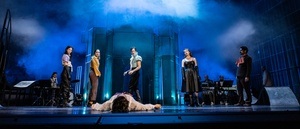Ausverkauft | Tristan (und Isolde)
In the organizer's words:
Love is love is silence is love is words is music?
The knight Tristan accompanies the king's daughter Isolde to Ireland, where she is promised to her uncle as a bride. On the way there, the two accidentally drink a magic potion that sparks a passionate love affair between them. They are caught in flagrante delicto, Tristan is seriously injured and flees to his homeland, where he waits eagerly for Isolde. When she finally comes to him, he dies in her arms. Isolde also follows him to her death.
This is the story of Richard Wagner's opera. The legend of Tristan and Isolde has fascinated writers since the 13th century and has been retold in numerous variations. Based on the verse novel "Tristan" by the medieval poet Gottfried von Strasbourg, Nele Jahnke and her team examine the myths of heroism, parenthood and intense, often tragic love. Do we love heartbreak so much that, despite the constant desire for a happy ending, we keep retelling the tragedy?
With their productions of "Anti・gone" in plain language and "Ich bin's Frank", Nele Jahnke and her long-time collaborators Hans-Jakob Mühlethaler and Sabina Winkler have set new standards in German-language theater. With "Tristan (and Isolde)", they continue their exploration of the German canon and language, integrating German sign language into their artistic process for the first time. The original language of the medieval verse novel - Middle High German - will not be neglected either.
If the feeling of love is so multifaceted and complex, how can it be conveyed appropriately in all its facets?
"For me, language is a playful space in which I can unfold. It is political and poetic."
- Johanna Kappauf, actress
This content has been machine translated.












